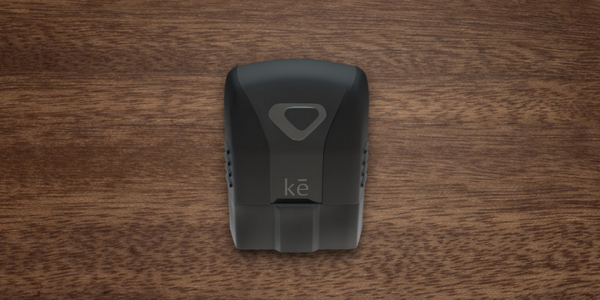A lot of brands see the growing popularity of connected cars as an opportunity for in-the-moment engagement with drivers. But right now, those building on-the road connected experiences face a scale problem. With only a small number of connected cars on the road, and with the technical challenges of developing apps that work across different manufacturers and operating systems, the ROI of these experiences is mostly hypothetical.
Drven, one of the latest startups to come out of Toronto’s MaRS Discovery District, says it has a solution: make every car a connected car. The company has developed a plug-and-play device called the Kē, which pairs with the driver’s smartphone so they can collect and view data on their car’s performance. Founder David Alleyne-Martin describes it as a “Fitbit for your car.”
Kē collects the same real-time internal data that a connected car does, so the driver can use it to save on insurance, get alerts on required maintenance, or get a quick estimate on the resale value of their vehicle. It also accepts some commands from the user’s phone, like remote starting the car.
Although a lot of that comes standard with modern cars, Alleyne-Martin said Kē is designed to work with almost every model released since 1996, which would extend the technology to more than 300 million cars already on the road. “The consumer will basically be able to upgrade all the features and services attached to their car without upgrading their car,” he said.
But rather than marketing the device directly to consumers, Drven wants to focus on partnering with brands and retailers that want to use the device to engage customers and collect data. Most of the services it offers will be tied to partners, and they’ll also be the primary means of distributing Kē to drivers. So, for example, if someone takes their car to their local garage, they’ll be able to pick up a free Kē to plug in and submit their maintenance data for future visits. (For drivers that want to buy the device online themselves, it will still be quite affordable at under $20.)
Brands that want to interact with their customers in a more direct way can tie in their loyalty programs and use the platform to message their members directly about rewards and promotions.
But perhaps the biggest opportunity for brands is the rich, real-time, first-party customer data that the platform gives them access to. “We know your car, make, model, kilometers travelled, home address, malls you go to, your driving behaviour, driver’s license information like age, sex, and height,” said Alleyne-Martin. “If you drive… to school, that’s probably a good indication that you have kids. So we know a fair bit about a consumer, and that’s before we start asking whether you’d like to link your profile with Facebook.”
He said that Drven takes the privacy and security of that data very seriously, and only shares it with partners and services customers explicitly opt into. It considers any data collected to be owned solely by the driver, not the company or the car’s manufacturer.
“Whether or not you want to share your data with, say, an insurance company to get a better rate, it’s entirely up to you,” he said. “You can turn that on and off, individually, within our app.”
The company has spent the past year working with MaRS to develop and test its prototype device. It plans to launch a beta with drivers at the end Q1 and is currently seeking investors.











